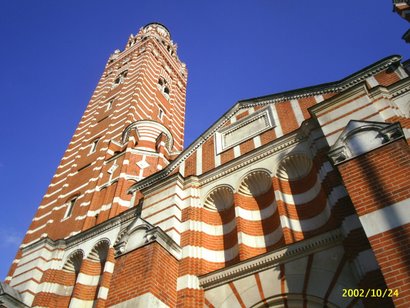The Monteverdi Vespers of 1610
 Last night, Westminster Cathedral took on for a while the role of St Marco's in Venice, as the Cathedral Choir performed Monteverdi's sublime Vespers to a packed Cathedral. It was part of the South Bank festival, which this year is devoted to Venetian music.
Last night, Westminster Cathedral took on for a while the role of St Marco's in Venice, as the Cathedral Choir performed Monteverdi's sublime Vespers to a packed Cathedral. It was part of the South Bank festival, which this year is devoted to Venetian music. The Concert was preceded by a talk given by the greatest living expert on Venice and Byzantium, John Julius Norwich. Lord Norwich spoke of Venice in the age of Monteverdi, and recalled a famous performance of the Vespers given by John Eliot Gardiner in San Marco's Basilica. On that memorable occasion, the soloists were placed high up in opposing galleries, creating what he described as a 'celestial Wimbledon'!
The Concert was preceded by a talk given by the greatest living expert on Venice and Byzantium, John Julius Norwich. Lord Norwich spoke of Venice in the age of Monteverdi, and recalled a famous performance of the Vespers given by John Eliot Gardiner in San Marco's Basilica. On that memorable occasion, the soloists were placed high up in opposing galleries, creating what he described as a 'celestial Wimbledon'! Although Claudio Monteverdi was born in Cremona, his name will always be associated with Venice. Originally composer to the court of Mantua, his Vespers of 1610 brought him to the attention of the Serene Republic, and in 1613 he was appointed conductor of the choir of San Marco – the Doge’s magnificent Byzantine basilica. There, Monteverdi established Venice at the pinnacle of European music; the scale and glory of his music reflects the conditions in the basilica, where he often placed choirs or soloists in opposing galleries to contrast their sound. Monteverdi died in 1643, and is buried in the vast Basilica of the Friari.
Although Claudio Monteverdi was born in Cremona, his name will always be associated with Venice. Originally composer to the court of Mantua, his Vespers of 1610 brought him to the attention of the Serene Republic, and in 1613 he was appointed conductor of the choir of San Marco – the Doge’s magnificent Byzantine basilica. There, Monteverdi established Venice at the pinnacle of European music; the scale and glory of his music reflects the conditions in the basilica, where he often placed choirs or soloists in opposing galleries to contrast their sound. Monteverdi died in 1643, and is buried in the vast Basilica of the Friari.


 It is worth quoting from the programme note:
It is worth quoting from the programme note: Tonight's performance does not take place in a concert hall, but in a sacred building - one full of architectural and devotional homages to the Virgin. In this modern concert performance, therefore, it is possible to detect undercurrents not usually present; the singing of the Office of Vespers is part of the Westminster Cathedral Choir's daily life, after all, and the pslam tones around which much of Monteverdi's music are based are still very much in the repertoire. Westminster Cathedral has much architecturally in common with St Mark's, and tonight's performance will use as much of the building as possible, taking its cue from the diverse combination of singers and instruments and the spatial separation implicit in certain movements.
Tonight's performance does not take place in a concert hall, but in a sacred building - one full of architectural and devotional homages to the Virgin. In this modern concert performance, therefore, it is possible to detect undercurrents not usually present; the singing of the Office of Vespers is part of the Westminster Cathedral Choir's daily life, after all, and the pslam tones around which much of Monteverdi's music are based are still very much in the repertoire. Westminster Cathedral has much architecturally in common with St Mark's, and tonight's performance will use as much of the building as possible, taking its cue from the diverse combination of singers and instruments and the spatial separation implicit in certain movements. 



3 comments:
The sacredness of music within the context of the Liturgy of the Church and as a devotional aid has been alluded to many times by the Holy Father. The following link is one of many on the subject. We are so blessed to have the choir and cathedral which we do. Thank you Monsignor for all the opportunities you give us to appreciate both in their organic unity.
http://www.zenit.org/article-20749?l=english
I haven't gasped quite so much in a long time as I did upon seeing those theorbos. Like mandolins someone has been growing for the prizes.
Theorboes? or chittarones?
Post a Comment